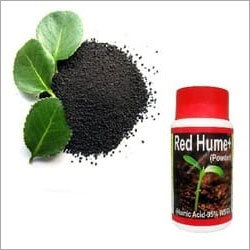Product Description
Being a recognized manufacturer, exporter and supplier, we are providing highly effective Humic Acid to our clients. Provided acid is primarily composed of carbon, oxygen, nitrogen and hydrogen that helps to improve overall plant growth, chlorophyll synthesis, nutrient uptake, seed germination and root vitality. It is is processed under the strict vigilance of our adept professionals using quality-assured organic ingredients in accordance with international quality standards. Following the diversified demands of clients, we are betrothed to offer this Humic Acid in numerous packaging options at most competitive price.
Humic Acid Features:
1. Easy to use
2. Non-toxic
3. Safe to use
4. Accurate compositions
5. Promotes the growth and increases the yield
6. Effective
7. Precise pH value
8. Purity
9. Longer shelf life
Humic Acid Specifications:
1. Form: Powder
2. Solubility: Soluble in water
3. Purity: 95% - 98%
4. Is It Organic: Yes
5. Color: Black
Humic Acid FAQ:
Q. What are the Benefits of Humic Acid?
Ans: Below are some of it's benefits:
- Improves soil structure and fertility by enhancing nutrient uptake.
- Acts as a chelating agent, making nutrients more available to plants.
- Stimulates plant growth and root development.
- Enhances soil water retention and reduces water runoff.
- Helps in detoxifying soil from heavy metals and other contaminants.
- Supports microbial activity in the soil, aiding in decomposition and nutrient cycling.
Q. How is Humic Acid Applied?
Ans: Humic Acid can be applied in various ways:
- Liquid form: Applied through irrigation systems or as a foliar spray.
- Granular form: Mixed into soil during planting or top-dressed onto existing vegetation.
- Powder form: Can be dissolved in water and applied as a solution.
Q. Is Humic Acid Safe for the Environment?
Ans: When used as directed, humic acid is generally considered safe for the environment. It is a natural product that decomposes over time, contributing to soil health and fertility. However, excessive or improper use may lead to nutrient runoff and environmental contamination.
Q. Can Humic Acid Be Used in Organic Farming?
Ans: Yes, humic acid is permitted for use in organic farming systems. However, it's important to ensure that the product used is certified organic and complies with organic farming regulations.
Q. What is the Difference Between Humic Acid and Fulvic Acid?
Ans: Humic acid and fulvic acid are both organic acids derived from decomposed organic matter. The main difference lies in their molecular size and solubility. Fulvic acid is smaller in size and more soluble in water, making it easier for plants to absorb directly. Humic acid, on the other hand, is larger and less soluble, providing more long-term benefits to soil structure and fertility.
Q. How Often Should Humic Acid Be Applied?
Ans: Application frequency depends on various factors such as soil type, crop type, and specific goals. Generally, humic acid can be applied 2-4 times per growing season, with some applications occurring during planting and others during key growth stages.
Q. Can Humic Acid Improve Crop Yields?
Ans: Yes, by improving soil fertility, nutrient availability, and root development, humic acid can contribute to increased crop yields. However, the extent of yield improvement may vary depending on other factors such as crop management practices, environmental conditions, and soil health.
Q. Where Can I Purchase Humic Acid?
Ans: Humic acid products are available from agricultural suppliers, garden centers, and online retailers. It's important to choose a reputable supplier and carefully read product labels to ensure quality and proper application.
Q. Is Humic Acid Suitable for all Types of Soil?
Ans: Humic acid can benefit a wide range of soil types, including sandy, clayey, and loamy soils. However, its effectiveness may vary depending on soil pH, organic matter content, and other soil characteristics. Conducting soil tests and consulting with agricultural experts can help determine the suitability and optimal application rates for specific soils.

 English
English Spanish
Spanish French
French German
German Italian
Italian Chinese (Simplified)
Chinese (Simplified) Japanese
Japanese Korean
Korean Arabic
Arabic Portuguese
Portuguese


